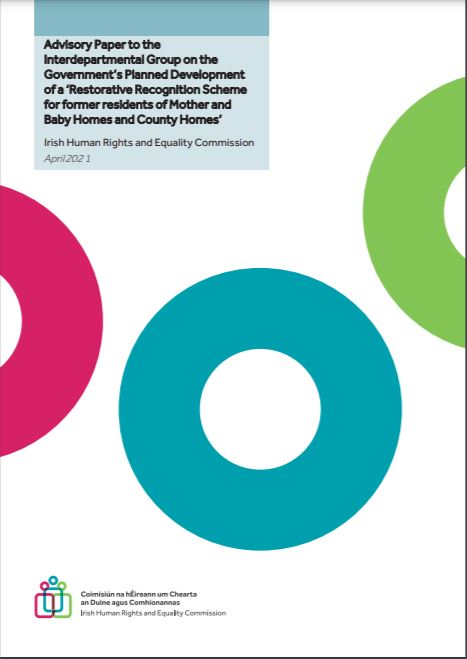The Irish Human Rights and Equality Commission (IHREC) has today published its recommendations to Government on the human rights and equality components of the redress scheme needed for survivors of Mother and Baby Homes.
The Commission’s independent advice was submitted to Government in April 2021 on foot of an invitation from the Minister for Equality in its role as Ireland’s National Human Rights Institution and National Equality Body.
This advice is published today as the Cabinet publishes the State’s proposed approach to the redress of Mother and Baby Home survivors.
The Commission undertook eight one-to-one listening sessions with survivors in preparing its April 2021 recommendations.
The survivors who spoke to IHREC emphasised the right to truth and for ‘free and unfettered’ access to their own personal information and records. All expressed their concern over the final report of the Commission of Investigation.
Among the recommendations IHREC set out in its submission:
- Survivors should not to have to accept the findings of the CoI Report in order to access redress.
- The Government needs to establish both an independent redress body to administer the scheme and an oversight mechanism to review decisions of that body.
- An “ex gratia” (without obligation) scheme, seeking to deny or limit liability, would not be optimal from an equality and human rights perspective. Monetary compensation alone without an acknowledgement can be offensive and inadequate.
- The scheme should facilitate apologies to the survivors from officials representing the State and relevant private entities.
- Redress for certain categories of survivors should be prioritised on the grounds of age, health and disability, and all applicants should be provided with legal advice and representation.
- Design and implementation of the entire scheme should be underpinned by human rights and equality principles.
- The scheme should be grounded in meaningful and ongoing participation from survivors in its design, development and implementation, including those who may face barriers to participation.
- Compensation should be adequate, proportionate to the gravity of the violation(s), and reflect both pecuniary and non-pecuniary harm. It should be part of a package of holistic and accessible measures to improve the quality of life of survivors.
- All women and children who were in Mother and Baby Homes, County Homes and other related institutions after 1974 should be eligible for reparations under the scheme or the State risks breaching equality obligations.
- There are significant potential impacts on survivors when engaging with a redress scheme, so the evidential threshold for access to the scheme should be survivor-centred with appropriate weight given to their testimony.
- Fair procedures must be clearly set out within the scheme, including dispute resolution and non-adversarial mediation and adjudication.
Sinéad Gibney, Chief Commissioner of the Irish Human Rights and Equality Commission stated:
“IHREC has published our independent advice provided to Government in April on the possible components of a human rights and equality compliant approach to redress.
“Redress is not a matter of the State writing a cheque and moving on. The survivors we spoke to when shaping our recommendations were universal in their desire for truth, information and a wider access to remedy.
“Today’s publication of the State’s proposals for the redress of Mother and Baby Home survivors is a vital step, but must be just one part of an ongoing conversation about redress, with and for survivors.”
Ends
For further information, please contact:
Brian Dawson, Communications Manager
087-0697095
Follow us on twitter @_IHREC
Editor’s Note
The full paper provided by the Irish Human Rights and Equality Commission is available at the following link:
The Commission provided this advice as Ireland’s National Human Rights Institution/ National Equality Body, and without prejudice to its broader position on the right to redress, which encompasses the right to truth, reparations and guarantees of non-repetition, restitution and rehabilitation.
The Irish Human Rights and Equality Commission
The Irish Human Rights and Equality Commission is an independent public body, appointed by the President and directly accountable to the Oireachtas. The Commission has a statutory remit set out under the Irish Human Rights and Equality Commission Act (2014) to protect and promote human rights and equality in Ireland, and build a culture of respect for human rights, equality and intercultural understanding in the State.
The Irish Human Rights and Equality Commission is Ireland’s national human rights institution and is recognised as such by the United Nations. The Commission is also Ireland’s national equality body for the purpose of a range of EU anti-discrimination measures.
